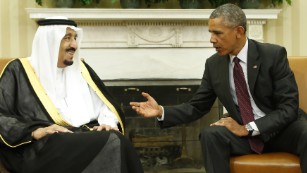BLACKEAGLE
SENIOR MEMBER
Why Saudis formed anti-terror coalition
By Nawaf Obaid
Updated 1428 GMT (2228 HKT) December 22, 2015
(CNN)Prince Mohammed bin Salman, the Saudi deputy crown prince and minister of defense, announced last week the formation of a kingdom-led, 34-state Islamic coalition to combat terrorism.
The statement from Riyadh cited "a duty to protect the Islamic nation from the evils of all terrorist groups and organizations, whatever their sect and name, which wreak death and corruption on earth and aim to terrorize the innocent." The major allied partners in the group include Pakistan, Nigeria, Turkey, Egypt, Malaysia and most of the Gulf Cooperation Council states.
This move is based upon some of the core tenets of the emerging Saudi Defense Doctrine, which has been developing over the last several years to address certain regional issues.
First, the Saudis and their allies have come to realize they must solve their own problems in the face of Western withdrawal. Second, they know they need to counter Iran's destabilizing regional actions being carried out in the name of an absurd revolutionary agenda. Finally, it is clear they must take on the terrorist groups and unstable states that are preventing peace and prosperity from taking root in the Middle East.
One of the core tenets of the doctrine on which this new coalition is based is that Saudi Arabia must be able to defend its homeland.
Much of the press has been about the coalition being formed to combat ISIS, and ISIS is definitely a threat to the Saudi homeland because it seeks to reinstate the caliphate and to do so it requires the kingdom's oil wealth and its custodianship of the two holy mosques in Mecca and Medina. ISIS has even launched a campaign against Saudi Arabia, called qadimun, which means "we are coming" to take over the country. But the kingdom's objective in forming this major coalition goes beyond ISIS, and it will be used to address any entity the Saudis deem to be a threat to their homeland.

Muslim nations vow to fight Islamic extremism 01:37
In fact, as Saudi Foreign Minister Adel al-Jubeir has said vis-à-vis the coalition's potential targets, "Nothing is off the table. It depends on the requests that come, it depends on the need and it depends on the willingness of countries to provide the support necessary."
Another core tenet of the Saudi Defense Doctrine is the importance of succeeding in counterterrorism efforts. Clearly, this new Islamic coalition will have the various terrorist threats of the region in its cross hairs. This will not only include ISIS, but al Qaeda, Hezbollah and other numerous Iran-funded Shia terrorist groups.
The Saudis have built up one of the world's most formidable counterterrorism programs that eradicated the al Qaeda network in the kingdom over the last decade. They and their allies have also engaged in U.S.-led bombings against ISIS in Syria, and they are leading another Arab coalition against the Iran-supported Houthi movement in Yemen. The watershed moment that this coalition potentially represents, however, is the formalized command and control coordination of all 34 nations' counterterrorism efforts, which will undoubtedly bring even greater successes in the global war on terror.
Bolstering the defense of partner states is another core tenet of the doctrine. The Saudis have realized for some time that they cannot allow neighboring states to become unstable. To that end, they have been heavily involved in providing financial and diplomatic support to states suffering in the post-Arab Awakening turmoil. They also intervened militarily in Bahrain when Iranian-guided Shia revolutionaries threatened the stability of the government.
Both of these actions were carried out to foil Iran-supported insurgencies, and there's no doubt the new 34-nation coalition -- from which Iran and its two proxy governments in Iraq and Syria are notably missing -- is partly about countering the Islamic republic's revanchist meddling in the region.

A Saudi coalition? Don't get too excited (Opinion)
To bolster the security of neighboring states, power projection missions to demonstrate real military might will be necessary, and succeeding in these efforts is another tenet of this new Saudi Defense Doctrine. As the threats to the region increase, those missions are likely to become larger and more complicated.
This is why the Saudis have put forth massive diplomatic efforts to pull so many states, especially the ones with powerful militaries, into the strategic fold, such as the Pakistani and Turkish armies.
Clearly, each state is only going to be able to participate in the coalition's efforts relative to its means. Some will provide weapons, some special forces and some financial and political support. But having a large coalition of nations to call upon when power needs to be projected will help the Saudi-led coalition assure that when military might is deployed, it stands the best chance at success.
The Saudi Defense Doctrine emerged out of the post-Arab Awakening disorder. The West, especially the United States, which tacitly supported the various revolutions, has also showed great hesitancy in attempting to solve the problems those revolutions created credibly. This withdrawal has forced the Saudis and their allies to take matters into their own hands, and the new Islamic coalition is a major step in that direction.
This does not mean, however, that the coalition won't be coordinating some actions with the United States and other major powers and international organizations, as Prince Mohammed has said. While the defense doctrine has always been about military independence for the Saudis and their Arab partners, it is also a pragmatic doctrine and will certainly involve elements of Western collaboration.
Over two years ago the Saudi Defense Doctrine began to emerge. The recently announced Saudi-led Islamic coalition against terror is based on the core tenets of that doctrine. The Saudis and their allies are going it alone to solve their region's problems, to counter Iran and to end terror and instability in the Middle East. This coalition is an important step in that direction, but it is only the beginning.
Why Saudis formed anti-terror coalition (Opinion) - CNN.com
By Nawaf Obaid
Updated 1428 GMT (2228 HKT) December 22, 2015
(CNN)Prince Mohammed bin Salman, the Saudi deputy crown prince and minister of defense, announced last week the formation of a kingdom-led, 34-state Islamic coalition to combat terrorism.
The statement from Riyadh cited "a duty to protect the Islamic nation from the evils of all terrorist groups and organizations, whatever their sect and name, which wreak death and corruption on earth and aim to terrorize the innocent." The major allied partners in the group include Pakistan, Nigeria, Turkey, Egypt, Malaysia and most of the Gulf Cooperation Council states.
This move is based upon some of the core tenets of the emerging Saudi Defense Doctrine, which has been developing over the last several years to address certain regional issues.
First, the Saudis and their allies have come to realize they must solve their own problems in the face of Western withdrawal. Second, they know they need to counter Iran's destabilizing regional actions being carried out in the name of an absurd revolutionary agenda. Finally, it is clear they must take on the terrorist groups and unstable states that are preventing peace and prosperity from taking root in the Middle East.
One of the core tenets of the doctrine on which this new coalition is based is that Saudi Arabia must be able to defend its homeland.
Much of the press has been about the coalition being formed to combat ISIS, and ISIS is definitely a threat to the Saudi homeland because it seeks to reinstate the caliphate and to do so it requires the kingdom's oil wealth and its custodianship of the two holy mosques in Mecca and Medina. ISIS has even launched a campaign against Saudi Arabia, called qadimun, which means "we are coming" to take over the country. But the kingdom's objective in forming this major coalition goes beyond ISIS, and it will be used to address any entity the Saudis deem to be a threat to their homeland.

Muslim nations vow to fight Islamic extremism 01:37
In fact, as Saudi Foreign Minister Adel al-Jubeir has said vis-à-vis the coalition's potential targets, "Nothing is off the table. It depends on the requests that come, it depends on the need and it depends on the willingness of countries to provide the support necessary."
Another core tenet of the Saudi Defense Doctrine is the importance of succeeding in counterterrorism efforts. Clearly, this new Islamic coalition will have the various terrorist threats of the region in its cross hairs. This will not only include ISIS, but al Qaeda, Hezbollah and other numerous Iran-funded Shia terrorist groups.
The Saudis have built up one of the world's most formidable counterterrorism programs that eradicated the al Qaeda network in the kingdom over the last decade. They and their allies have also engaged in U.S.-led bombings against ISIS in Syria, and they are leading another Arab coalition against the Iran-supported Houthi movement in Yemen. The watershed moment that this coalition potentially represents, however, is the formalized command and control coordination of all 34 nations' counterterrorism efforts, which will undoubtedly bring even greater successes in the global war on terror.
Bolstering the defense of partner states is another core tenet of the doctrine. The Saudis have realized for some time that they cannot allow neighboring states to become unstable. To that end, they have been heavily involved in providing financial and diplomatic support to states suffering in the post-Arab Awakening turmoil. They also intervened militarily in Bahrain when Iranian-guided Shia revolutionaries threatened the stability of the government.
Both of these actions were carried out to foil Iran-supported insurgencies, and there's no doubt the new 34-nation coalition -- from which Iran and its two proxy governments in Iraq and Syria are notably missing -- is partly about countering the Islamic republic's revanchist meddling in the region.

A Saudi coalition? Don't get too excited (Opinion)
To bolster the security of neighboring states, power projection missions to demonstrate real military might will be necessary, and succeeding in these efforts is another tenet of this new Saudi Defense Doctrine. As the threats to the region increase, those missions are likely to become larger and more complicated.
This is why the Saudis have put forth massive diplomatic efforts to pull so many states, especially the ones with powerful militaries, into the strategic fold, such as the Pakistani and Turkish armies.
Clearly, each state is only going to be able to participate in the coalition's efforts relative to its means. Some will provide weapons, some special forces and some financial and political support. But having a large coalition of nations to call upon when power needs to be projected will help the Saudi-led coalition assure that when military might is deployed, it stands the best chance at success.
The Saudi Defense Doctrine emerged out of the post-Arab Awakening disorder. The West, especially the United States, which tacitly supported the various revolutions, has also showed great hesitancy in attempting to solve the problems those revolutions created credibly. This withdrawal has forced the Saudis and their allies to take matters into their own hands, and the new Islamic coalition is a major step in that direction.
This does not mean, however, that the coalition won't be coordinating some actions with the United States and other major powers and international organizations, as Prince Mohammed has said. While the defense doctrine has always been about military independence for the Saudis and their Arab partners, it is also a pragmatic doctrine and will certainly involve elements of Western collaboration.
Over two years ago the Saudi Defense Doctrine began to emerge. The recently announced Saudi-led Islamic coalition against terror is based on the core tenets of that doctrine. The Saudis and their allies are going it alone to solve their region's problems, to counter Iran and to end terror and instability in the Middle East. This coalition is an important step in that direction, but it is only the beginning.
Why Saudis formed anti-terror coalition (Opinion) - CNN.com

